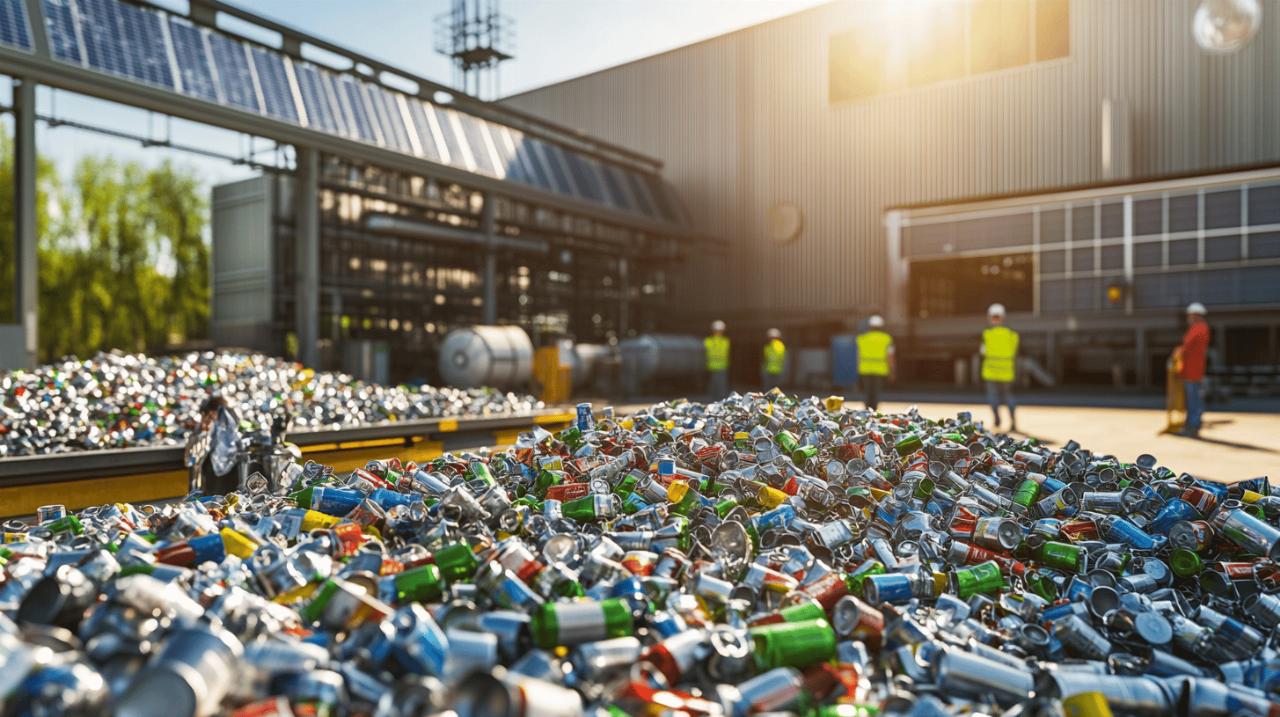Recycling aluminium cans has emerged as a practical and increasingly popular method for generating supplementary income whilst contributing to environmental sustainability. Whether you are seeking to earn a modest sum from household waste or exploring the potential for a more substantial recycling venture, understanding the professional methods and market dynamics can transform this everyday activity into a genuinely profitable endeavour. This comprehensive guide examines the value inherent in aluminium recycling, explores professional crushing techniques, and provides actionable strategies for maximising your returns through efficient collection and processing.
Understanding the Value of Aluminium Can Recycling
Why aluminium cans are worth your time
Aluminium cans represent one of the most valuable recyclable materials readily available to individuals and small-scale collectors. Unlike many other forms of household waste, aluminium retains significant intrinsic value throughout the recycling process, making it an attractive commodity for recycling centres and scrap metal dealers alike. The metal itself can be recycled indefinitely without degradation of quality, which ensures a consistent demand from manufacturing industries seeking to reduce production costs and environmental impact. When you collect and process aluminium cans systematically, you are not merely disposing of waste but participating in a circular economy that values resource recovery. The lightweight nature of aluminium cans means that even modest collection efforts can accumulate substantial weight over time, translating directly into earnings. Many recycling centres and specialist facilities offer competitive rates, with prices typically ranging from forty to sixty pence per kilogram, which equates to approximately sixty-five crushed cans. This rate fluctuates based on global aluminium prices, but the fundamental value remains robust due to the metal's versatility and widespread industrial application.
Current Market Rates and What You Can Expect to Earn
Current market rates for aluminium cans in the United Kingdom are influenced by several factors, including global commodity prices, regional demand, and the specific policies of individual recycling centres. At present, many facilities offer between forty and sixty pence per kilogram for clean, crushed aluminium cans. To put this into perspective, approximately sixty-five standard beverage cans will yield one kilogram of aluminium, meaning that diligent collection efforts can accumulate meaningful financial returns over time. Some recycling centres provide price guarantees and will match or beat competitor rates to secure your business, making it worthwhile to compare offerings from multiple facilities before committing to a particular collection programme. Additionally, certain regions have implemented deposit return schemes, where consumers receive a refundable deposit on each beverage container purchased, creating an additional revenue stream for those who collect these containers systematically. For individuals willing to invest time and effort into regular collection and proper processing, annual earnings can range from modest supplementary income to more substantial sums, particularly when combining aluminium recycling with other recyclable materials such as mobile phones, ink cartridges, and even luxury packaging items that fetch premium prices on resale platforms.
Professional crushing methods to maximise your returns
Choosing the Right Can Crusher for Your Needs
Selecting an appropriate can crusher is a critical decision that directly impacts the efficiency and profitability of your recycling operation. Manual can crushers are the most economical option and are well-suited for individuals processing moderate volumes of cans. These devices typically mount to a wall or workbench and allow you to compress cans with minimal physical effort, reducing their volume by up to seventy-five per cent. For those handling larger quantities, such as individuals collecting from local businesses or community events, pneumatic or electric can crushers offer significantly enhanced throughput and consistency. These professional-grade machines can process hundreds of cans per hour, ensuring that your collection efforts translate into dense, transportable loads that maximise space efficiency during storage and transport. When evaluating can crushers, consider factors such as build quality, ease of maintenance, and compatibility with various can sizes. Some models are designed specifically for standard beverage cans, whilst others accommodate a wider range of container types. Investing in a robust, reliable crusher not only streamlines your workflow but also enhances the quality of your crushed cans, which can positively influence the rates offered by recycling centres. Many suppliers offer free delivery on orders exceeding forty-nine pounds, making it economically viable to acquire professional equipment without incurring prohibitive shipping costs.
Proper Storage and Transport Techniques for Crushed Cans
Efficient storage and transport are essential components of a successful can recycling operation, as they directly affect the volume you can collect and the frequency with which you visit recycling centres. Once cans are crushed, they should be stored in durable, weather-resistant containers such as heavy-duty plastic bins or reinforced sacks designed for metal collection. Storing crushed cans in organised, accessible containers prevents contamination from moisture or other waste materials, which can reduce the value of your aluminium and complicate the sorting process at recycling facilities. For individuals collecting cans on a larger scale, consider dedicating a secure storage area within your home or garage where multiple containers can be kept clean and dry until they reach capacity. When transporting crushed cans, ensure that your vehicle is equipped to handle the weight and volume of your load, as compressed aluminium can be surprisingly heavy in bulk. Using stackable containers or large sacks simplifies loading and unloading whilst minimising spillage and disorder. Establishing a regular collection schedule, whether weekly or monthly, helps maintain a steady flow of material to recycling centres and ensures that you capitalise on current market rates without delay. Many experienced recyclers also recommend keeping a record of weights and earnings to track profitability and identify patterns in pricing or demand.
Finding the Best Recycling Centres and Collection Programmes
How to locate recycling centres that pay top rates
 Identifying recycling centres that offer the most competitive rates requires diligent research and a willingness to explore multiple facilities within your region. Begin by consulting online directories and local council resources to compile a list of recycling centres and scrap metal dealers that accept aluminium cans. Many centres maintain updated price lists on their websites or are willing to provide quotes over the telephone, enabling you to compare rates before committing to a particular facility. When contacting centres, enquire not only about pricing but also about any restrictions on minimum or maximum quantities, payment methods, and whether they offer additional incentives such as price guarantees or loyalty programmes. Some recycling centres have established price guarantee policies, promising to match or exceed any lower rate you find elsewhere for equivalent material, which can provide both financial security and peace of mind. Beyond pricing, consider the operational hours, location, and ease of access for each facility, as frequent visits are necessary to maintain a steady income stream. Regional variations in market rates can be significant, so it may be advantageous to visit centres in neighbouring areas if travel costs are offset by higher payments. Additionally, some facilities offer specialised programmes for schools and public sector entities, providing credit terms of up to thirty days, which can be beneficial for larger organisations seeking to integrate recycling into their operational budgets.
Identifying recycling centres that offer the most competitive rates requires diligent research and a willingness to explore multiple facilities within your region. Begin by consulting online directories and local council resources to compile a list of recycling centres and scrap metal dealers that accept aluminium cans. Many centres maintain updated price lists on their websites or are willing to provide quotes over the telephone, enabling you to compare rates before committing to a particular facility. When contacting centres, enquire not only about pricing but also about any restrictions on minimum or maximum quantities, payment methods, and whether they offer additional incentives such as price guarantees or loyalty programmes. Some recycling centres have established price guarantee policies, promising to match or exceed any lower rate you find elsewhere for equivalent material, which can provide both financial security and peace of mind. Beyond pricing, consider the operational hours, location, and ease of access for each facility, as frequent visits are necessary to maintain a steady income stream. Regional variations in market rates can be significant, so it may be advantageous to visit centres in neighbouring areas if travel costs are offset by higher payments. Additionally, some facilities offer specialised programmes for schools and public sector entities, providing credit terms of up to thirty days, which can be beneficial for larger organisations seeking to integrate recycling into their operational budgets.
Building relationships with scrap metal dealers
Establishing strong, mutually beneficial relationships with scrap metal dealers can significantly enhance the profitability and sustainability of your can recycling venture. Dealers who recognise you as a reliable and consistent supplier are more likely to offer preferential rates, flexible payment terms, and timely communication regarding market fluctuations. Begin by selecting a few reputable dealers and introducing yourself in person, explaining the volume and quality of aluminium you intend to supply on a regular basis. Many dealers appreciate suppliers who deliver clean, properly crushed cans, as this reduces their processing time and increases the overall value of the material. Over time, as trust is built, you may negotiate improved pricing structures or receive advance notice of rate changes, enabling you to time your deliveries strategically. Maintaining professional communication through phone calls or emails, and honouring agreed-upon delivery schedules, reinforces your credibility and fosters a long-term partnership. Some dealers also offer insights into broader market trends and may suggest opportunities for expanding your recycling activities to include other metals or materials. For those who aspire to scale their operations, these relationships can provide access to larger contracts, bulk collection opportunities, and even financing options for acquiring professional-grade crushing and storage equipment.
Scaling up your can recycling business
Tips for Collecting Cans in Bulk from Local Businesses
Expanding your can recycling activities beyond household collection to include bulk sourcing from local businesses can dramatically increase your income potential and establish your venture as a more structured enterprise. Begin by identifying businesses that generate significant volumes of beverage containers, such as pubs, restaurants, offices, and event venues. Approach these establishments with a clear proposal outlining your collection service, emphasising the convenience of regular pickups, the environmental benefits of responsible recycling, and the potential for them to receive a share of the proceeds or simply reduce waste management costs. Many businesses appreciate the opportunity to enhance their sustainability credentials without incurring additional expenses or administrative burdens. Establish a consistent collection schedule, whether weekly or fortnightly, and provide labelled recycling bins or sacks to facilitate the separation and storage of cans on-site. Reliable service and professionalism are paramount, as businesses will only continue partnerships with collectors who honour commitments and maintain communication. Consider formalising agreements through simple contracts that specify collection frequency, responsibilities, and any financial arrangements. As your network of business partners grows, so too will your volume of collectible cans, enabling you to negotiate better rates at recycling centres and invest in more advanced crushing and storage equipment to streamline operations.
Keeping records and maximising your recycling income
Maintaining detailed records of your recycling activities is essential for maximising income, ensuring accountability, and facilitating future expansion of your operation. Begin by documenting each collection session, noting the date, source of cans, approximate weight, and any associated costs such as transport or equipment maintenance. When visiting recycling centres, retain receipts and payment confirmations, as these provide a verifiable record of earnings and assist in tracking fluctuations in market rates over time. Using a simple spreadsheet or accounting software allows you to analyse trends, identify the most profitable collection sources, and calculate your effective hourly earnings. This data-driven approach enables informed decision-making regarding which businesses or collection routes to prioritise and when to time your deliveries to coincide with favourable market conditions. Additionally, accurate record-keeping is invaluable for tax purposes, particularly if your recycling activities generate income that must be declared to HM Revenue and Customs. By treating your recycling venture with the seriousness and professionalism of a small business, you position yourself to capitalise on opportunities for growth, secure financing for equipment upgrades, and potentially transition from a supplementary income source to a full-time enterprise. Engaging with online communities, forums, and local recycling groups can also provide valuable insights, tips, and support from fellow recyclers who have successfully scaled their operations.

